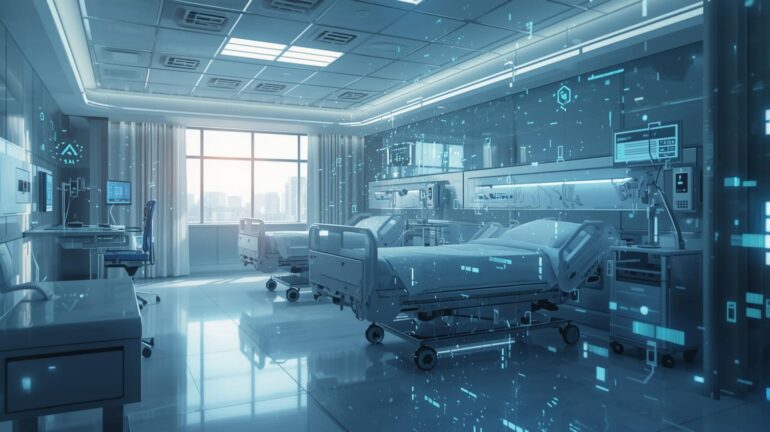
Healthcare has always been at the forefront of innovation, and today, Artificial Intelligence (AI) is driving one of its most profound transformations. Once limited to research labs and theoretical models, AI is now being integrated into hospitals, clinics, and even patients’ homes. From early disease detection to robotic surgeries, AI is not just improving healthcare efficiency it is saving lives. As populations grow and healthcare systems face increasing pressure, AI offers solutions that could redefine medicine for the 21st century.
One of the most promising applications of AI lies in diagnostics. Medical imaging, for example, has been revolutionized by AI algorithms capable of detecting abnormalities with remarkable precision. Systems trained on thousands of X-rays, CT scans, and MRIs can identify early signs of diseases such as cancer, heart disease, and neurological disorders. In many cases, these tools achieve accuracy rates comparable to or even surpassing human radiologists. Early detection is critical in improving survival rates, and AI enables clinicians to make faster, more informed decisions.
Beyond imaging, AI is also reshaping predictive healthcare. By analyzing patient data, including medical history, lifestyle factors, and genetic information, AI models can forecast the likelihood of developing certain conditions. For instance, AI tools can predict the risk of heart attacks or strokes before symptoms appear, allowing doctors to recommend preventive treatments. This shift from reactive to proactive care could significantly reduce hospital admissions and healthcare costs, while empowering patients to take control of their health.
AI is also proving invaluable in drug discovery and development. Traditionally, bringing a new drug to market takes years of research and billions of dollars in investment. AI accelerates this process by analyzing vast chemical databases, predicting how molecules will interact, and identifying promising candidates in a fraction of the time. During the COVID-19 pandemic, AI was instrumental in helping researchers analyze virus structures and speed up vaccine development. This ability to rapidly generate solutions could be a game-changer in responding to future global health crises.
In the operating room, robotics powered by AI are assisting surgeons in performing complex procedures with enhanced precision. These systems can analyze patient data in real time, guide surgical instruments with sub-millimeter accuracy, and even predict potential complications. The result is reduced recovery times, fewer surgical errors, and better patient outcomes. For surgeons, AI provides an invaluable partner enhancing, not replacing, their expertise.
AI is also making strides in personalized medicine. No two patients respond to treatments in exactly the same way, but AI can analyze patterns across large datasets to recommend tailored therapies. In oncology, for example, AI tools help doctors determine which combination of treatments will work best for an individual patient based on their genetic profile and tumor characteristics. This approach not only improves success rates but also minimizes side effects, making treatment more effective and humane.
Beyond clinical care, AI is transforming hospital management and operations. AI-powered scheduling systems optimize staff deployment, while predictive analytics forecast patient admission rates, helping hospitals prepare resources in advance. Virtual assistants and chatbots provide 24/7 support to patients, answering routine queries, booking appointments, and even offering mental health support. This reduces the administrative burden on healthcare professionals and improves patient experience.
However, the integration of AI into healthcare raises important challenges. Data privacy is at the forefront, as sensitive patient information must be protected from breaches and misuse. Strong regulatory frameworks and secure systems are essential to maintaining trust. Another concern is bias in AI algorithms. If the data used to train AI models lacks diversity, the outcomes may disadvantage certain populations. For example, diagnostic tools trained primarily on data from one ethnic group may underperform when applied to others. Addressing these biases is critical to ensuring equity in healthcare delivery.
There is also the question of human oversight and accountability. While AI can assist in decision-making, the ultimate responsibility must remain with medical professionals. Over-reliance on AI could lead to errors if systems malfunction or produce flawed recommendations. Ensuring that AI remains a supportive tool rather than an autonomous decision-maker is key to safe adoption.
Despite these challenges, the opportunities are immense. AI is already reducing diagnostic errors, accelerating drug development, and making healthcare more personalized and accessible. For overburdened healthcare systems, it offers a chance to do more with less delivering better care to more people at lower costs.
The future of healthcare will not be shaped by AI alone, but by how it is integrated into human expertise. Doctors, nurses, and caregivers bring empathy, judgment, and trust qualities machines cannot replicate. Together, AI and human intelligence form a partnership with the potential to transform medicine. In the years ahead, AI will not just support healthcare it will be an essential component of saving lives and building healthier societies.